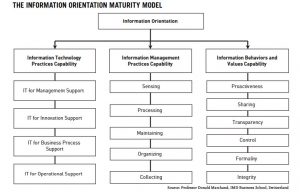Great Small Business Ideas to Start: Information orientation
Given that billions of dollars are invested each year in IT software and hardware, we might expect managers to know exactly how information technology improves their organization’s results. Exactly what is the connection between the billions invested annually in IT, and improvements in productivity and performance? Information orientation has the answer—the three things that connect IT with business results.
The idea
Professor Donald Marchand together with William J. Kettinger conducted research at IMD business school that identified three critical factors driving successful information use. These three capabilities contain 15 specific competencies.
The three “information capabilities” combine to determine how effectively information is used for decision making:
- Information behaviors and values. This is the capability of an organization to instill and promote behaviors and values for effective use of information. Managers need to promote integrity, formality, control, transparency, and sharing, while removing barriers to information fl ow and promoting information use.
- Information management practices. Managing information involves sensing, collecting, organizing, processing, and maintenance. Managers set up processes, train their employees, and take responsibility for the management of information, thereby focusing their organizations on the right information. They take care to avoid (or at least minimize) information overload, improve the quality of information available to employees, and enhance decision making.
- Information technology practices. IT infrastructure and applications should support decision making. Consequently, business strategy needs to be linked to IT strategy so that the infrastructure and applications support operations, business processes, innovation, and decisions.

Several companies have successfully implemented major IT projects, including Banco Bilbao Vizcaya Argentaria (BBVA) and SkandiaBanken, Sweden’s first branchless bank.
BBVA transformed its failing branch-based retail banking business into one of the most successful banks in Spain within 1,000 days. This was accomplished by getting the right information to people in the branches, enabling them to successfully cross-sell their products.
SkandiaBanken created a model for online business that has been profitable and has surpassed larger institutional competitors in customer service and value. Although a pure internet and telephone bank, SkandiaBanken’s managers attribute their success to a business model that integrates simple IT infrastructure and web solutions, easy information access for customers and employees, and a company culture stressing transparency, personal responsibility, and action.
In practice
- Recognize that managing information depends upon people: how they use available information and systems, how they share their knowledge with others, and how motivated they are to use information to innovate and create value.
- Assess, develop, and improve the processes to manage information and knowledge. Remember that the technology itself, while essential for success, is not a corporate panacea.
- Find out more about information orientation from Professor Donald Marchand or IMD business school, or read about it in detail online or in print in his book Making the Invisible Visible.
